Ricochet is the best place on the internet to discuss the issues of the day, either through commenting on posts or writing your own for our active and dynamic community in a fully moderated environment. In addition, the Ricochet Audio Network offers over 50 original podcasts with new episodes released every day.
 Could We Build Our Interstate Highway System Today?
Could We Build Our Interstate Highway System Today?
Today is the 65th Anniversary of the Federal Highway Aid Act, which launched President Eisenhower’s long-held vision of a national interstate highway network.
Every time I mention Dwight Eisenhower as the most consequential President of the past 70 years, I get quizzical looks.
What about Ronald Reagan, I’m asked? Fair enough. Reagan transformed not just a major political party or even our national economy but the world by helping the former Soviet Union drive itself six feet underground. All good. Much of it sadly has been or is being undone by subsequent Presidents, politicians, and Congresses, sadly enough.
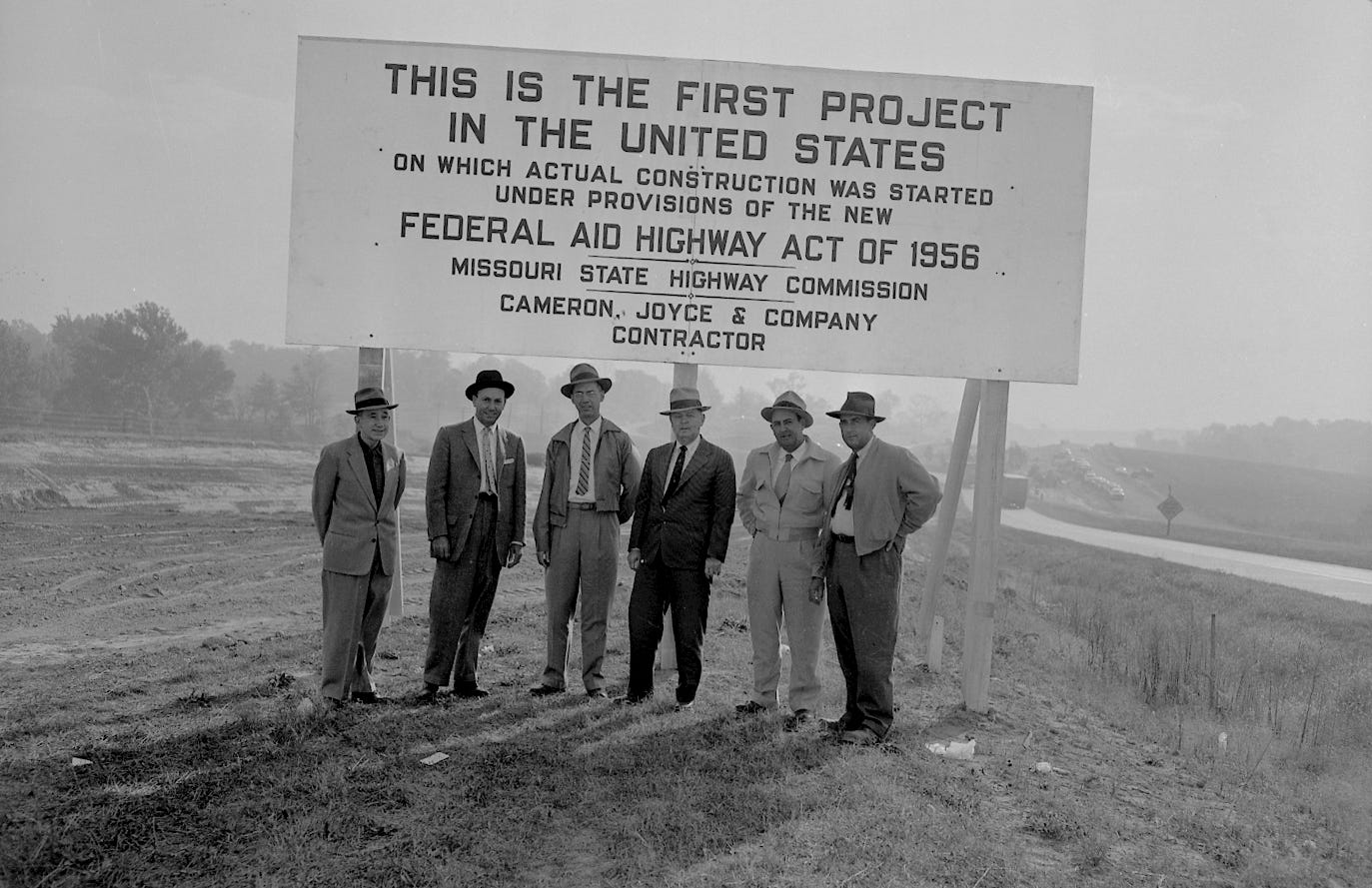
But our Interstate Highways System persists and remains a crown jewel of our economy, even our way of life.
This holiday weekend, or the next time you hop on I-395, I-295, I-270, or I-66 leaving Washington, or perhaps I-76, I-476, or I-95 escaping from the “greater” Philadelphia region, think of President Eisenhower. My wife and I have driven more than 4,000 miles across 20 states since January; the interstate highways we traversed are almost too many to recite, from I-270 in Maryland to I-40 from west Texas to North Carolina. You Californians practically live on the parking lots you call freeways.
The system touches every state – even Hawaii.
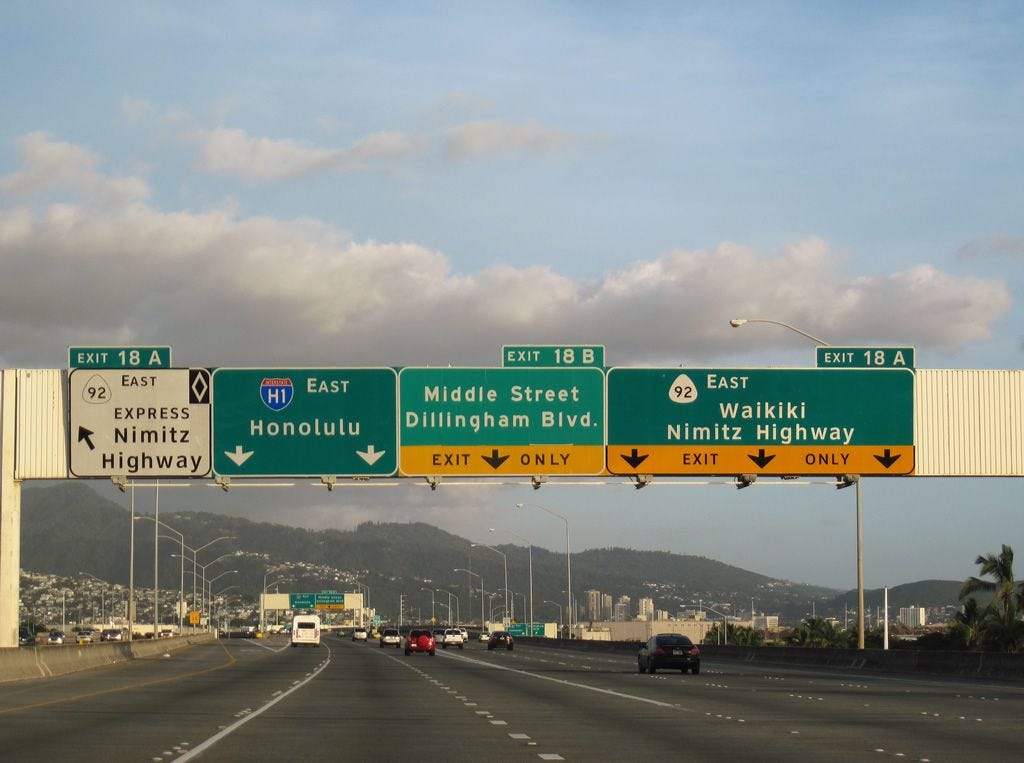
As a young lieutenant colonel in 1919, just as automobile ownership and use were exploding across the US, Eisenhower was part of a military expedition (Military Transport Corps) to determine how difficult it would be to move troops from one end of the country (Washington, DC), much of it along the Lincoln Highway to the other (San Francisco). It took 62 painful, arduous days. He referenced that trip in a book he would later write.
And later, General Eisenhower would be impressed with Germany’s autobahn highway system during WWII, which facilitated the movement of enemy troops and supplies.
Today, you can make Eisenhower’s 1919 trip (not on the same roads) in as little as two, maybe three, very long days, depending on how much of a hurry you are in and how much help you have behind the wheel. Truckers do it frequently, even routinely (although they have federal regulations limiting how much time they can spend road on any given day). Given the massive growth in federal regulations over infrastructure projects, from laws protecting endangered species to many other things, I wonder if we could achieve today what Eisenhower started?
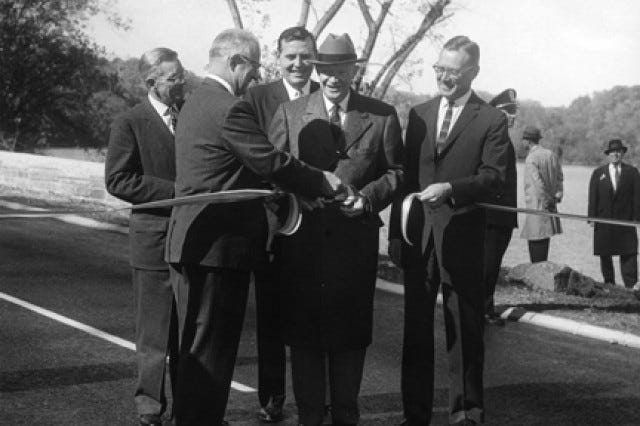
On this day in 1956, President Eisenhower signed the Federal Aid Highway Act that made today’s 41,000-mile “national system of interstate and defense highways” possible. Today, the Pennsylvania Turnpike (I-76) is considered the “grandfather” of the interstate system. The longest interstate highway, at 3,200 miles, is I-90 connecting Boston with Seattle. It amazes me that we have 5 major east-west interstate highways, including I-80, I-70, I-40, and I-10.
But Eisenhower didn’t stop there. Remember, he was President during the “Cold War,” and worried about continuity of government in case of a nuclear attack from the Soviet Union. Many of us remember, well into the 1980s, how odd it was that Interstate 64 from Richmond ended not far from White Sulphur Springs, WV (it has since been completed); or that an Amtrak train from Washington, DC also weirdly ended near the same location.
The reason was exposed in 1992 when the Washington Post uncovered the fact that the Greenbrier Resort, under a secret agreement with Congress in 1955, was established as a secret “bunker” for Congress to be preserved. A visit to the Greenbrier resort is not complete without a “bunker tour.” Interstate 64 and the Amtrak train were designed to expeditiously ferry government officials to an undisclosed location under the imminent threat of a nuclear attack. Congress has since made other contingency plans.
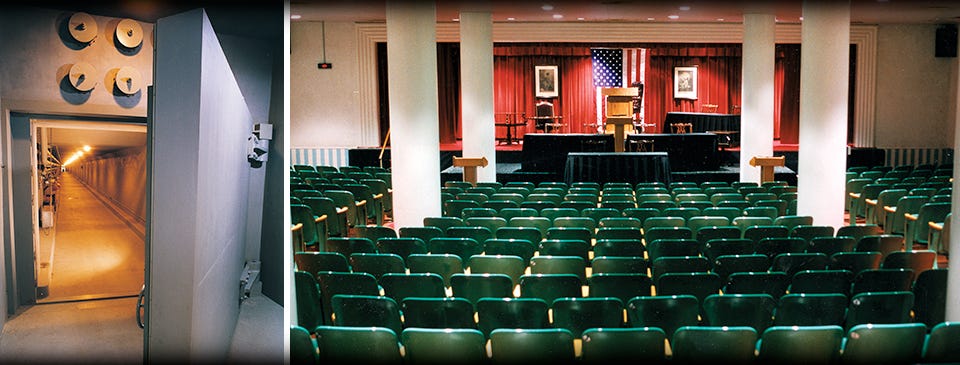
Now, of course, we have miscreant politicians trying to interpose cultural issues (racism, of course) on the construction of the interstate system. Of course, mistakes were made that divided cities from waterfronts and divided or paved over neighborhoods. A house in which I grew up in north Tulsa, Oklahoma, is now paved over by an interstate. Those in Philadelphia are painfully reminded of how the failure to make I-95 a tunnel underneath Philadelphia divided the city from its Delaware River waterfront. It’s a travesty. Constructions contracts have been enmired too frequently in often corrupt practices and failed management.
But that was not Eisenhower’s fault. The impact of his vision, born out of painful experience nearly 40 years earlier, was no less impactful on our economy (and national defense) than today’s digital revolution. He deserves honor and praise.
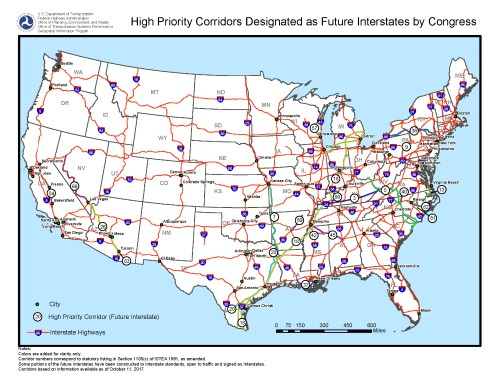
Yes, these highways and bridges need some maintenance and updating. Trucks should be equipped with an extra axle to better distribute weight, improve safety, and allow them to carry more goods. And electric vehicles, which often weigh more than conventional autos, should not be subsidized, but instead, pay their fair share to maintain roads and bridges.
That’s why a highly focused infrastructure bill – focused on roads, bridges, ports, some mass transit, and broadband – is a good thing. Let’s hope Congress gets its act together and produces something sooner than later that doesn’t micromanage what the more inventive and better-managed states can fully implement or infect with the CRT (Critical Race Theory) virus. I can’t say that I’m optimistic.
Disclosure: I served as Deputy Assistant Secretary for Public Affairs at the US Department of Transportation in 1991-92 – the last time that the federal gas tax was increased under the Intermodal Surface Transportation and Efficiency Act (ISTEA), during the George H. W. Bush Administration.
Published in General



Not sure I agree. I-35 through OKC had no problems. Same with I-40 through Albuquerque and Arizona. Maybe tougher on the E. Coast.
People who have lived abroad also say that as much as we complain about it, the postal system in the U.S. really is better than what most countries have.
It’s because of those greedy concrete contractors. ;)
I wasn’t even thinking about concrete, but asphalt. Double it for concrete.
I don’t recall his quote word-for-word so I won’t repeat it, but we’ve been electing morons at least since the time of Mark Twain.
Good article, Kelly, but I disagree with this:
As I recall, the original idea of the Interstate Highway system was that the federal government would pay to build it, then the responsibility of repairing and maintaining it would be turned over to the states. I know it won’t happen, but I’d like to get back to that. I want roads and bridges properly maintained — and upgraded if necessary — but I want each state to pay for their own.
The greater the distance between the payer and the beneficiary of the expenditure, the greater the potential for waste. When a politician is looking at how much to upgrade a road and their own constituents are going to have to pay for it, they are going to look more closely at cost vs. benefits than if Uncle Sam is going to be footing the bill or paying for most of it. Money from Washington is thought of as free money from heaven. Someone is going to get it, so let’s make sure our state gets its fair share. The more the better. Who cares if a project costs hundreds of millions of dollars and only benefits a small number of people? Senator X is bringing home the bacon for us!
We saw that with “The Bridge to Nowhere.”
Thus my theory that the interstates should have been built with THREE sets of two lanes each, with one set of lanes only used while one of the others is being worked on, thus allowing maintenance to be done without interfering with traffic.
Not sure Randy. As I recall Ike wanted it built to make it easier for military to moved stuff (e.g rockets) if things went south with Russia. Seem to recall some split on maintenance (maybe 80% feds, states the rest). In the end worked out to let all of us travel a lot quicker. Could never happen today.
I seem to remember that there was supposed to be a one mile straight section every five miles to serve as runways (obviously impossible in the mountains).